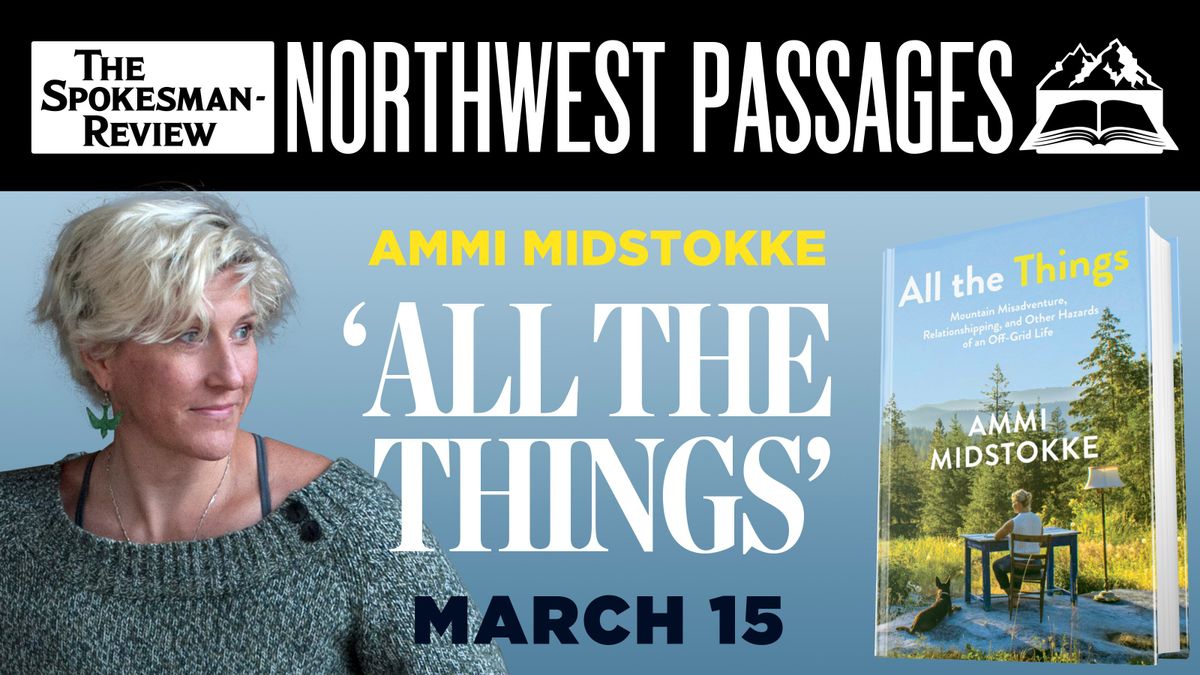This column reflects the opinion of the writer. Learn about the differences between a news story and an opinion column.
Book review: Ammi Midstokke’s ‘All the Things’ teaches us how to live a happy life

Ammi Midstokke is like the mythical guru living on a mountain top providing practical proverbs that steer us towards happiness.
Instead of climbing the mountain or jack-knifing our vehicle into a snowbank at the bottom of her driveway to get those gold nuggets of wisdom, we merely need to pick up a copy of her column in The Spokesman-Review– or get her book “All the Things: Mountain Misadventure, Relationshipping, and Other Hazards of an Off-Grid Life.”
The book is a collection of essays from The Spokesman-Review’s Outdoors section , rich with a tapestry of life for anyone willing to learn from their mistakes, not stress over the small stuff or wanting to repair a wood stove chimney with a ladder, a Subaru roof rack and a double prusik rigging system.
We learn early on Midstokke grew up with parents living off the grid and, like most children, couldn’t wait to escape – until she wanted to return.
“I vowed to move to the city as soon as I had my freedom,” she writes. “I would never chop wood again. The water pup would never freeze. The lights would never dim. … I experienced all that for the last twenty years. Modern amenities and urban living. Turns out, I kinda like chopping wood. And it’s cheaper than CrossFit.”
The call of the wild, however offers challenges of woodpeckers drilling holes in the wall that disrupt sleep, making cozy habitat for squirrels, and garden-munching varmints. Even her dog finds new best friends. “It’s like she’s siding with them,” Midstokke writes.
She’s looking for love on remote mountain trails, where she admits it’s hard to meet anyone. But she has simple needs: someone with a shared love of David Bowie, “can ride a mountain bike and owns a climbing rack with more economic value than their car.”
The cool mountain air, however, apparently makes one gracious about mansplaining.
“My inbox filled with advice last week. Impressive, considerate, and helpful comments rolled in by people with far more knowledge and common sense than I have. I did notice a clear trend: Boys told me how I could have done it better/safer/different. Girls told me I was rad and solution-oriented. I needed both varieties, so my heartfelt thanks goes out to each and every one of you.”
Midstokke’s writing is easy to fall for, and the short, sweet columns come together more than a series of daily slices and more like a story of a life well-lived. Her wit makes you laugh at her foibles until you cry at her losses. Throughout everything, though, there is emotional growth and hope at the end of the trail.
We get parenting advice: “Volcanos are often a good way to break a child of the are-we-there-yet habit.”
Learn that going to Burning Man is more fun than Disneyland (Rob Curley take note).
Discover that spray foam will fix almost anything with a hole or gap in it, especially when you live in a strawbale house with no right angles “built presumably by someone on a psilocybin vision quest.”
Appreciating a garden that failed to produce an ample harvest but gave delight to a 4-year-old.
The value of giving a best friend a dying wish of climbing Mount Kilimanjaro even if the barn budget needed adjusting.
“Stick to the number,” she tells dad of the barn expense. “The buffer is going to Tanzania.”
“Glad to see you’ve got your priorities right,” he responds.
And like any mountaintop guru, we ultimately leave knowing the meaning of life – or at least how to live a happy one through Ammi Midstokke’s eyes.
“I would argue,” she writes, “that happiness is made up of the many experiences in a day that bring us joy or contentment, is in that first sip of coffee, how my daughter sneaks under the covers with me, when the wind sings in the trees, when hummingbirds pause on a blossom, when friends make me laugh, when my frozen face is suddenly warmed again by the afternoon sun.”
I would add reading these essays is one of those joyous moments.